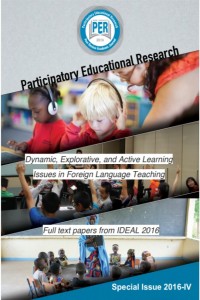Abstract
References
- Berthet, A. et all. (2006). Alter Ego, Paris : Hachette.
- Bozbeyoğlu, S. (2000). Enseignement du Français Langue Etrangère, [French Language Teaching] Şahin Matbaası.
- Büyükikiz, K. ve Hasırcı, S. (2013). Yabanci Dil Olarak Türkçenin Öğretiminde Sözcük Öğretimi Üzerine Bir Değerlendirme, Mustafa Kemal Üniversitesi Sosyal Bilimler Enstitüsü Dergisi, 10 / 21, 145-155
- Cavalla C. et al. (2009) Le vocabulaire en classe de langue. [The Vocabulary in Language Classroom] Paris : CLÉ International
- Demirel, Ö. (2012). Yabancı dil öğretimi. [Foreign Language Teaching] Ankara: Pegem Akademi.
- Diller İçin Avrupa Ortak Başvuru Metni, (2001).
- Günday, R. (2015). Yabancı Dil Öğretiminde Yaklaşımlar, Yöntemler, Teknikler ve Multimedya Araç ve Materyalleri, [Approaches, Methodes , Techniques and Multimedia Tools –Materials in Foreign Language Teaching] Ankara: Favori
- Hameau, M.A. (1971). Enseignement du vocabulaire. [Vocabulary Teaching] A.Reboullet (Ed.), Guide pédagogique pour le professeur du français langue etrangère. Paris: Hachette.
- Kantemir, E. (1997). Yazılı ve Sözlü Anlatım. [Written adn oral Expression] Ankara: Engin Yayınevi.
- Karatay, H. (2207). Kelime Öğretimi. GÜ, Gazi Eğitim Fakültesi Dergisi, Cilt 27, Sayı 1, 141-153
- Monnerie-Goarin, A. et all. (2006). Métro Saint-Michel, Paris, CLE.
- Rey, A. (1998). Micro Robert, Paris.
- Niklas-Salminen, A. (1997). La lexicologie. [Lexicology] Paris: Armand Colin.
- Özbay, M. ve Melanlıoğlu, D. (2008). “Kelime Öğretiminde Örneklemenin Önemi ve Divanü Lügati’t Türk”. Mustafa Kemal Üniversitesi Sosyal Bilimler Enstitüsü Dergisi, 5 (10), 49-58.
- Simonnet, G. (T. Yok). L’enseignement du Français aux Etrangères. Alliance Française, No:34.
- Tréville M.C. et Duquette L. (1996) Enseigner le vocabulaire en classe de langue. [Vocabulary Teaching in Foreign Language Classroom] Paris :Hachette
- Türk Dil Kurumu (2011). Türkçe Sözlüğü, [Turkish Dictionary]Ankara.
Abstract
The words are called as basic building
blocks of language. It is impossible to discuss the language system without
words. It is related to the vocabulary whether a language is rich or not. It is
also related to the peoples’ vocabulary to understand what is said and written
or to express effectively their thoughts and their feelings verbally or in
written way. It is needed to have a rich vocabulary to produce successful
written works on various topics. Due to these reasons the word has been
accepted a significant area of research; it has been studied on each period and
it continues to be like this. The vocabulary teaching-learning has a great
importance as an integral component of language in foreign language teaching;
because the words are the most essential building blocks in the development of
all basic language skills. The people communicate mainly through the words.
The study is a theoretical knowledge based
on research. At the same time it is aimed to analyze two different course books
in terms of vocabulary teaching towards the principles of action-oriented
approach. As an example Alter Ego and Métro Saint-Michel are examined. While vocabulary teaching is merely given in
the activities of other language skills without giving any place to vocabulary
teaching in the book Alter Ego, in the book Métro Saint Michel the vocabulary
teaching is continued at the part of vocabulary both based on the knowledge and
the activities. As a result, it is very important to realize vocabulary
teaching by activities and social tasks focused on active participation of
learners and by learning in context.
References
- Berthet, A. et all. (2006). Alter Ego, Paris : Hachette.
- Bozbeyoğlu, S. (2000). Enseignement du Français Langue Etrangère, [French Language Teaching] Şahin Matbaası.
- Büyükikiz, K. ve Hasırcı, S. (2013). Yabanci Dil Olarak Türkçenin Öğretiminde Sözcük Öğretimi Üzerine Bir Değerlendirme, Mustafa Kemal Üniversitesi Sosyal Bilimler Enstitüsü Dergisi, 10 / 21, 145-155
- Cavalla C. et al. (2009) Le vocabulaire en classe de langue. [The Vocabulary in Language Classroom] Paris : CLÉ International
- Demirel, Ö. (2012). Yabancı dil öğretimi. [Foreign Language Teaching] Ankara: Pegem Akademi.
- Diller İçin Avrupa Ortak Başvuru Metni, (2001).
- Günday, R. (2015). Yabancı Dil Öğretiminde Yaklaşımlar, Yöntemler, Teknikler ve Multimedya Araç ve Materyalleri, [Approaches, Methodes , Techniques and Multimedia Tools –Materials in Foreign Language Teaching] Ankara: Favori
- Hameau, M.A. (1971). Enseignement du vocabulaire. [Vocabulary Teaching] A.Reboullet (Ed.), Guide pédagogique pour le professeur du français langue etrangère. Paris: Hachette.
- Kantemir, E. (1997). Yazılı ve Sözlü Anlatım. [Written adn oral Expression] Ankara: Engin Yayınevi.
- Karatay, H. (2207). Kelime Öğretimi. GÜ, Gazi Eğitim Fakültesi Dergisi, Cilt 27, Sayı 1, 141-153
- Monnerie-Goarin, A. et all. (2006). Métro Saint-Michel, Paris, CLE.
- Rey, A. (1998). Micro Robert, Paris.
- Niklas-Salminen, A. (1997). La lexicologie. [Lexicology] Paris: Armand Colin.
- Özbay, M. ve Melanlıoğlu, D. (2008). “Kelime Öğretiminde Örneklemenin Önemi ve Divanü Lügati’t Türk”. Mustafa Kemal Üniversitesi Sosyal Bilimler Enstitüsü Dergisi, 5 (10), 49-58.
- Simonnet, G. (T. Yok). L’enseignement du Français aux Etrangères. Alliance Française, No:34.
- Tréville M.C. et Duquette L. (1996) Enseigner le vocabulaire en classe de langue. [Vocabulary Teaching in Foreign Language Classroom] Paris :Hachette
- Türk Dil Kurumu (2011). Türkçe Sözlüğü, [Turkish Dictionary]Ankara.
Details
| Primary Language | English |
|---|---|
| Subjects | Studies on Education |
| Journal Section | Research Articles |
| Authors | |
| Publication Date | December 1, 2017 |
| Acceptance Date | November 30, 2016 |
| Published in Issue | Year 2017 Volume: 4 Issue: 2 |



